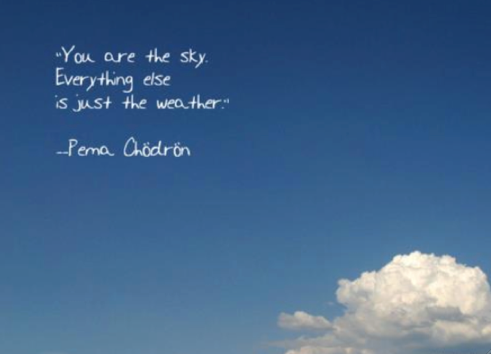About Silence - Mauna
At Holistic Yoga Retreats we include periods of silence within the schedule in order to enhance the other practices that we do and to support the process of going deeper within ourselves. This use of Silence on yoga and meditation retreats is very common, and traditionally includes refraining from writing, reading and making eye contact as well. In our weekend retreats, these periods are relatively short, typically from bedtime until mid morning or lunchtime the following day.
Although this is something that—at least at first—some people can find a little unusual, uncomfortable or challenging, by the end of the retreat it is always the case that people have come to value and appreciate the contribution that these periods of silence have made to their experience of being on retreat.
We can look at this practice of silence from two different angles. On the one hand, we can’t get away from the fact that it involves restricting ourselves from doing something that is normal and habitual to us – talking.
Although this is something that—at least at first—some people can find a little unusual, uncomfortable or challenging, by the end of the retreat it is always the case that people have come to value and appreciate the contribution that these periods of silence have made to their experience of being on retreat.
We can look at this practice of silence from two different angles. On the one hand, we can’t get away from the fact that it involves restricting ourselves from doing something that is normal and habitual to us – talking.
By refraining from this habitual act, we support our ability to turn inwards. Our intention during a retreat, as the word implies, is to become more connected with our inner life, giving us the opportunity to make beneficial change. Speaking with others necessarily places a significant part of our attention on what is outside ourselves. Simply put, we can't help but become more entangled in other people's opinions and perceptions, in social niceties and social norms, in what others might think of us and what we think of them.
We can see how we sometimes use talking as a distraction from what is going on for us at a deeper level. Just as we can use food, media and technology to push down or take our attention away from inner feelings, particularly if they are somewhat uncomfortable, so too we can end up using talking in this way. Of course, this is not true in all cases, and so at our retreats we try to strike a balance between the nourishment that comes from silence and the nourishment that comes from the kinds of uplifting, supportive or inspiring conversations that we can have with others.
We can see how we sometimes use talking as a distraction from what is going on for us at a deeper level. Just as we can use food, media and technology to push down or take our attention away from inner feelings, particularly if they are somewhat uncomfortable, so too we can end up using talking in this way. Of course, this is not true in all cases, and so at our retreats we try to strike a balance between the nourishment that comes from silence and the nourishment that comes from the kinds of uplifting, supportive or inspiring conversations that we can have with others.

Another angle on silence is positively embracing the silence as an experience in itself, rather than it being a lack of something. This is quite different from merely not talking: this is about embracing the beauty, depth and richness of silence. In so doing, we may experience a different kind of seeing, listening, sensing and moving in the world.
This is about connecting with ourselves, with others and with life itself in a deeper, more direct way. It may facilitate the development of intuition, peace, insight, self awareness, love, compassion and other higher faculties.
As with meditation, this is not something that we can just experience instantly or in a lasting way. In fact, we may find that by not talking with others, things get very loud in our heads, almost deafening. We may experience repetitive thoughts, judgements, the inner critic, or annoying songs that go round and round in our heads. We can even think that we are going mad, as we witness the disconnected, foreign or bizarre nature of the thoughts and voices in our heads.
This is about connecting with ourselves, with others and with life itself in a deeper, more direct way. It may facilitate the development of intuition, peace, insight, self awareness, love, compassion and other higher faculties.
As with meditation, this is not something that we can just experience instantly or in a lasting way. In fact, we may find that by not talking with others, things get very loud in our heads, almost deafening. We may experience repetitive thoughts, judgements, the inner critic, or annoying songs that go round and round in our heads. We can even think that we are going mad, as we witness the disconnected, foreign or bizarre nature of the thoughts and voices in our heads.

Nevertheless, even if the thoughts can get louder, the whole process of thinking, and, importantly, of not thinking, becomes more distinct. The increased volume only serves to help us become more aware of when we are thinking and when we are not. Often, we are so identified with thoughts that we do not realise how continual the thought stream is and how powerful it is in shaping and colouring our experience in terms of our relationship with others, ourselves and the world in general.
It is this awareness of the fact that we are thinking that can give us more freedom to choose not to continue with a thought stream once we have noticed that this is what is happening. This we do by grounding our awareness in the sensations of the body, the breath or the sounds and colours around us. Another way is to pay more attention to the silence itself, to take such an interest in it that our minds incline towards it, and thoughts—starved of the attention they feed on—whither away naturally.
We hope you will come to enjoy and appreciate these short, silent periods so that, as the Vietnamese meditation master Thich Nhat Hahn says about this practice, you can experience it as very healing and can allow the silence and calmness to penetrate your flesh and bones.
We hope you will come to enjoy and appreciate these short, silent periods so that, as the Vietnamese meditation master Thich Nhat Hahn says about this practice, you can experience it as very healing and can allow the silence and calmness to penetrate your flesh and bones.
The noble silence was good for me but also an interesting group activity - I think it helped us all feel comfortable with each other.
Suzanne